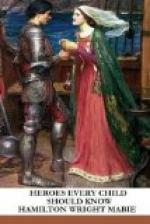Though not a few died of sickness, yet did the host daily grow greater. Many who had stayed behind in various cities, their zeal having grown stale, now came back to the camp, judging that they would do well to take part in an enterprise that was now near to success. Also many that had tarried on the march for the cause of sickness now made shift to come to the camp. Some I saw carried in litters, and others that could scarce set one foot before the other crawled painfully along the road. Many of these were slain by the Turks, but not the less did the rest brave the dangers of the journey. And in the camp there was a great furbishing of arms and armour, and trimming of the plumes of helmets, for it was counted an unseemly thing that any man should enter such a place as the Holy City save in his best array.
On a certain evening, some eleven days after the coming of the army to Beitenoble, there was a council held in the tent of King Richard, at which were present the Master of the Templars and the Master of the Hospitallers, and other chief men in the army. About an hour after sunset the council came to an end; darkness had long since fallen, but it chanced to be full moon, and the faces of them that had been present at the council were plain to be seen. Before ever a word was said, it was manifest to all that a great misfortune had befallen them. For the faces of these men were clouded with discouragement. And straightway all the multitude that had been gathered together departed every man to his own place. There needed no proclaiming that neither on the morrow nor on any other day would there be a marching to the Holy City.
On the 8th day of January the army departed from Beitenoble, and on the 20th it came, after much toil and suffering, for the rain and tempest scarcely abated for a single hour through the twelve days, to the city of Ascalon.
For some little time, King Richard and his army dwelt in peace in the city of Ascalon. Nor can it be denied that they gathered strength; the sick, being duly handled by their physicians, were restored to a sound body, and they that were wearied with the labours of long-continued warfare had rest and refreshment. Nevertheless it may be doubted whether the King was able to advance the cause at all which he had in hand, namely, the taking of the Holy City. And the chief cause was this, that the Christians, not having for the present a common foe with whom to contend, began to quarrel among themselves more grievously than ever. So the King and the French, among whom, now that the French King had departed to his own land, a certain Duke of Burgundy was chief, fell out, and this with such heat, that the duke departed from Ascalon to Acre in great haste, and all the Frenchmen followed him.




